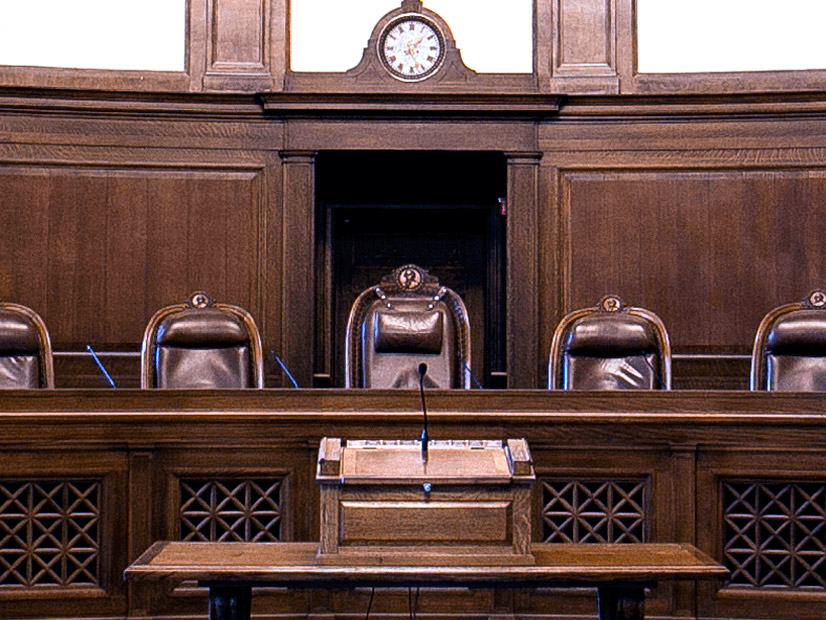A Washington Supreme Court hearing on Tuesday provided a judicial practice run for possible upcoming court battles over Gov. Jay Inslee’s partial vetoes of recently passed cap-and-trade and low-carbon fuel standard (LCFS) bills.
The stakes: How fast will those climate change bills be implemented? And where is the red line between the powers of the state legislature and the governor?
On Tuesday, attorneys for the legislature and governor’s office argued before the state’s high court over a Thurston County Superior Court judge’s 2020 decision that Inslee illegally vetoed parts of a state transportation budget package in 2019. No ruling was made.
The arguments of Tuesday’s Supreme Court hearing are highly similar to those raised by Inslee and legislative leaders in mid-May when the governor vetoed pieces of the two climate change bills.
Democratic legislative leaders are angry that Inslee, also a Democrat, vetoed segments of the bills that were agreed on after complicated compromise talks within their own party to ensure enough votes would support passage of the two controversial bills. Democrats are the majority party in each chamber, and party leaders and a few newspaper editorial boards contend the vetoes sabotaged the trust needed to get the two bills passed.
Unhappy with Inslee nullifying their internal compromises on the bills, Democratic legislative leaders have threatened a lawsuit to reverse the governor’s vetoes.
Consequently, the Supreme court’s ruling on the 2019 transportation package vetoes will likely be a major influence on the upcoming litigation on the climate change bill vetoes.
The May vetoes removed sentences and segments tying implementation of the two climate change bills to the eventual passage of a major transportation package — a plank required by some moderate Democrats in return for their support. No date has been set for discussion on that package. Possibilities include a special session later this year, or regular sessions in 2022 or 2023.
Inslee’s partial vetoes will kickstart implementation of the two climate change bills on July 1.
‘Little Bit Fuzzy’
In Tuesday’s arguments over he 2019 budget vetoes, Deputy Solicitor General Alicia Young, representing the governor’s office, said Inslee has the constitutional right to eliminate single sentences or subsections of bills, especially if the legislature deliberately wrote bills in ways to avoid partial vetoes.
Inslee said that the effective date of a bill is normally set out in its own single section, meaning it can be vetoed without affecting the rest of the bill. The governor said that the effective dates of the two climate change bills — whenever a transportation budget package is passed — are buried within bill sections covering other planks of the legislation.
Inslee wrote: “It strains the imagination to discern any reason for embedding into a single section a delayed effective date that impacts not just that one section, but also multiple additional sections, unless that reason is to prevent it from being vetoed. This type of legislative drafting demonstrates manipulation and a palpable attempt at dissimulation.”
Inslee added that a 1997 state Supreme Court decision ruled against this type of bill writing. During Tuesday’s hearing, questions from at least two Supreme Court justices appeared to support Inslee’s interpretation.
Jeffrey Even, attorney for the legislature, countered that the Washington Constitution limits partial vetoes to designated subsections of any bill — and that leaves individual sentences within subsections off-limits to partial vetoes.
Even also argued that the legislature is not obligated to write a bill to make it easier for the governor to veto any part of it
“At the margin, that standard can get a little bit fuzzy,“ Justice Debra Stephens said.
Chief Justice Steven González wondered how someone could prove that the legislature wrote a bill to avoid partial vetoes.
Sen. Reuven Carlyle’s (D) bill requires Inslee to appoint a task force by July 1 to lead brainstorming efforts on creating a cap-and-trade program administered by the Washington Department of Ecology.
The task force will create a system to annually set the state’s total industrial carbon emissions, a cap that slowly decreases through the years. Four times a year, large emitters would submit bids in an auction for segments of that year’s overall limit and be allowed to emit that amount in greenhouse gases. Companies will be allowed to trade, buy and sell those allowances.
An environmental justice panel would be appointed to ensure low-income neighborhoods and communities of color would not be disproportionally hit with excess pollution. The bill anticipates the auctions would raise several hundred million dollars that the state could allocate to disadvantaged communities.
Preliminary task force recommendations would be due by Nov. 1, with final recommendations ready to be sent to the legislature by Dec. 1.
Rep. Joe Fitzgibbon’s (D) LCFS bill requires that carbon emissions from gasoline and diesel fuel sold in Washington be cut by 10% below 2017 levels by 2028 and by 20% by 2035. It excludes emissions from fuel that is exported out of state or used by water vessels and railroad locomotives. The goals apply to overall vehicle emissions in the state and not to individual types of fuels. Northwestern Washington has five oil refineries. The rules go into effect Jan. 1, 2023.
Inslee has strongly pursued both concepts for years. His partial vetoes do not affect the bills’ main planks.



